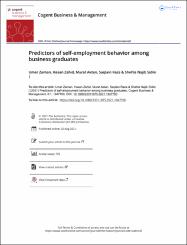| dc.contributor.author | Zaman, Umer | |
| dc.contributor.author | Zahid, Hasan | |
| dc.contributor.author | Aktan, Murat | |
| dc.contributor.author | Raza, Saqlain | |
| dc.contributor.author | Sidiki, Shehla Najib | |
| dc.date.accessioned | 2021-08-19T08:49:02Z | |
| dc.date.available | 2021-08-19T08:49:02Z | |
| dc.date.issued | 2021 | en_US |
| dc.identifier.citation | Umer Zaman, Hasan Zahid, Murat Aktan, Saqlain Raza & Shehla Najib Sidiki | (2021) Predictors of self-employment behavior among business graduates, Cogent Business & Management, 8:1, 1947760, DOI: 10.1080/23311975.2021.1947760 | en_US |
| dc.identifier.issn | 2331-1975 | |
| dc.identifier.uri | https://doi.org/10.1080/23311975.2021.1947760 | |
| dc.identifier.uri | https://hdl.handle.net/20.500.12809/9488 | |
| dc.description.abstract | Self-employment skills (also known as entrepreneurship) play a vital role in the economic development of a country, thus should be given enough attention while designing business education programs. The purpose of this study is to investigate the predictors of self-employment behavior amongst business students in Pakistan. In this regard, the impact of entrepreneurial education, business incubation programs, students' entrepreneurial self-efficacy, and social entrepreneurial attitude on students' entrepreneurial intention and behavior was examined. Also, the moderating role of psychological empowerment on the relationship between self-employment intention and self-employment behavior was analyzed. A total of 542 valid responses were collected through a self-administrative questionnaire from business students in the public universities in Pakistan. The data were analyzed through partial least square structural equation modeling (PLS-SEM) by using smart PLS 3.0 software. The findings show that entrepreneurial education, business incubation programs, entrepreneurial self-efficacy, and social entrepreneurial attitude significantly and positively influence self-employment intention which in turn positively predicts self-employment behavior. Whilst, the moderating role of psychological empowerment between self-employment intention and behavior was not confirmed. Based on the findings, theoretical and practical implications have been discussed to help the policymakers, government institutions, and universities to develop and implement educational strategies to increase students' self-employment behavior. | en_US |
| dc.item-language.iso | eng | en_US |
| dc.publisher | Taylor & Francis Inc. | en_US |
| dc.relation.isversionof | 10.1080/23311975.2021.1947760 | en_US |
| dc.item-rights | info:eu-repo/semantics/openAccess | en_US |
| dc.subject | Business incubation programs | en_US |
| dc.subject | Self-employment intention | en_US |
| dc.subject | Entrepreneurial education | en_US |
| dc.subject | Entrepreneurial self-efficacy | en_US |
| dc.subject | Social entrepreneurial attitude | en_US |
| dc.title | Predictors of self-employment behavior among business graduates | en_US |
| dc.item-type | article | en_US |
| dc.contributor.department | MÜ, İktisadi ve İdari Bilimler Fakültesi, Uluslararası Ticaret ve Finansman Bölümü | en_US |
| dc.contributor.authorID | 0000-0003-3683-7796 | en_US |
| dc.contributor.institutionauthor | Aktan, Murat | |
| dc.identifier.volume | 8 | en_US |
| dc.identifier.issue | 1 | en_US |
| dc.relation.journal | COGENT BUSINESS & MANAGEMENT | en_US |
| dc.relation.publicationcategory | Makale - Uluslararası Hakemli Dergi - Kurum Öğretim Elemanı | en_US |


















